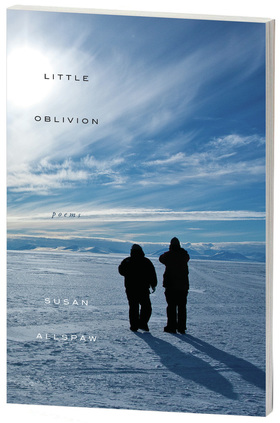|
In her introduction to Little Oblivion, Susan Allspaw’s award-winning volume of poems, Teresa Leo, the judge of Elixir Press's 2013 Annual Poetry Awards, frames her appraisal of Allspaw’s work by invoking Richard Hugo’s essay “The Triggering Town”:
Leo’s enthusiasm for Little Oblivion is well-deserved; Allspaw’s poems explore with richness and nuance both external and internal landscapes encountered and observed by the speaker. They introduce the reader to a world that both attracts and repels, that embraces and frightens. Unfortunately, Leo only applies to Allspaw’s poems a portion of Hugo’s thesis. The result is an incomplete evaluation of the poet’s work in this volume. This is not unexpected in a judge’s introduction, but Leo’s application of only one piece of Hugo’s concept is neither fair to Hugo nor honest to the reader. This critique may seem unfair: an introduction is not a review, but neither should it be an extended jacket blurb.
The “triggering town” described by Hugo is one which the poet has never seen before. Hugo's point is this: “If you have no emotional investment in the town, though you have taken immediate emotional possession of it for the duration of the poem, it may be easier to invest the feeling in the words." For Hugo, a poet’s lack of emotional investment in the triggering town, enabled by the lack of an actual physical history with the place, serves to aid the poet in shifting her “allegiance from the triggering subject to the words.” Hugo’s ultimate concern is this adjustment—from subject to language. Leo calls on Hugo’s essay and then immediately acknowledges Allspaw’s multiple trips to Antarctica. This is more than a trifle. These poems, despite the beauty of their descriptions of landscapes, physical and emotional, are as a collection less powerful than they might be because the poet has not made a necessary and sufficient shift from subject to language. Allspaw herself hints some acknowledgment of this in “Lessons from Ghosts”: “In all our safety, we remain snowblind, tricked / into believing Antarctica is ours. We remain, // gripping the ice as if we were saving it, when we / are the ones being held, possessed.” If Allspaw has taken emotional possession of her subject (and is not hampered by emotional investment in it), it is incomplete. Throughout the volume, it is clear that Antarctica has at least an equal claim on the poet. The struggle for emotional supremacy actually becomes a theme of the book. An unfortunate consequence of this ongoing strife, however, is the poet’s occasional inability to focus adequate attention on language and craft, to the detriment of the poems’ potential to transform the imagination of the reader in a way that mirrors the transformations contemplated by the poems themselves. Leo’s introduction focuses entirely on the imagery evoked by, and the meanings underlying, Allspaw’s poems—and indeed there is much to admire about both in these poems. In “Heading Into Dion Island, Antarctica,” the poet expertly braids a description of a particular outing in service of science with regret about the speaker’s dead father:
The poem closes powerfully: “I can’t reach him through the salt water. / Sea smoke, my father. Brash churned with tide.” The language of the poem is spare, and Allspaw effectively manipulates the pace of the poem through careful attention to syntax and punctuation. Her insertion of the comma in the last line—“Sea smoke, my father.”—is particularly skillful.
Imagery is Allspaw’s strong suit, and many of the images in Little Oblivion surprise and delight as they discuss how the harsh environment transforms visitors to Antarctica. In “Letter to the Mate on Watch,” the speaker remarks on the “reverse sunrise” on the face of the seaman, Paul, caused by the glow of nautical instruments. She then observes a transformation: “This winter, the ice / hides all hints of ocean swell, but when the ship / is still enough, I can see your body sway; ocean / has worked its way into your bones.” The frankly sexual imagery in the second stanza of this poem works, too, although the associational jump between the two stanzas is abrupt and highlights the poet’s tendency to introduce named characters without providing the reader with sufficient grounding in their identities. That same quirk is the only distraction in the excellent “What Happens During Whiteouts in Antarctica,” in which a character named Demitri is addressed directly twice. The reader, however, is left with little understanding of who this person is; it could just as easily be Janice or Jack. Although the poem continues Allspaw’s inspired reflections upon the landscape, e.g. how blocks of snow are “stacked / to kiss the wind and turn it around,” the direct address to the undeveloped character Demitri hints at a less than generous hermeticism that appears periodically in Little Oblivion. The poet’s tendency to keep the reader at arm’s length in this way is one hint that she has not heeded Hugo’s urging to “switch your allegiance from the triggering subject to the words." Further evidence that Allspaw has a ways to go in turning her allegiance toward language may be seen in the careless manner in which she sometimes approaches diction and figurative language in these poems. Her strength is imagery. Her occasional struggles with grammar and simile, however, diminish her poems’ power. Grammar first. Although poets have every right to manipulate grammatical rules when it serves their poems, unintentional grammatical errors are significant interruptions. Several of these appear in Little Oblivion, and when they occur early in a poem, the poem struggles to recapture the reader’s attention or imagination. One jarring example occurs early in “Other Bodies,” as the poet describes an airplane fuselage “laying sideways." Even a poem that ends as strongly as this one does—“a continent filled with crevasses must have some small offering of salvation”—cannot recover from the failure in the first line to use the verb lie correctly. Similarly, “Station Close, McMurdo Station” includes the speaker’s imagining what happened “[w]hen Atlantis sunk." One wishes in cases like these for an editor’s intervention. Grammar is corrected easily enough. More troubling is the looseness of Allspaw’s figurative language. The very transformation that the poet describes effectively in many of these poems could be enacted through the transformative nature of precise similes. In many instances, though, Allspaw squanders that opportunity. In “Reverse Homesickness,” for example, the interesting metaphor in lines 8-9 equating hearts with “lonely nunataks / dressed in white” is followed by a description of how an ice cap “clings like an anxious crow call / to a field of scarecrows.” With enough work, a reader might be able to garner something from the rather awkward vehicle in this simile, but odds are slim that the effort will justify the interruption of the poem’s movement. Similarly distracting and unhelpful similes are found in other poems. In the middle of “A Consequence of Irony,” an otherwise engaging meditation exploring, as several poems in Little Oblivion do, the speaker’s relationship with the divine, the reader encounters this: “My fingers rock a lava bomb like / a lullaby, like an orphan on his first night with new parents." The tenor and vehicles are nearly impossible to decipher. Another example that perhaps makes the point best is the opening sentence of “McMurdo Spring”: “Potholes love like the rest of us— / they absorb runoff like alcoholics on a Friday night, / holy divots, brown birdbaths." Similes like this one raise questions of logic rather than mystery that leads to a deeper, transformed understanding of the simile’s tenor. Much of what is fine in Little Oblivion is summarized well in Leo’s introduction. The subject matter of the poems is fascinating, and the poet adroitly connects the beauty, strangeness, and harsh realities of Antarctica’s landscape and climate with struggles of the inner life. The reader’s disappointment, then, is not likely to come from the project itself but from the realization that, had the poet followed Hugo’s admonition for poets to swear loyalty to language over subject, the poems would be significantly stronger. PHILIP BELCHER has published poetry and critical prose in journals such as Passages North, Shenandoah, Asheville Poetry Review, South Dakota Review, Southeast Review, Fugue, and The Southern Quarterly. His chapbook, The Flies and Their Lovely Names, was published by Stepping Stones Press in 2007. He holds an MFA in poetry from Converse College, as well as degrees from Furman University, Southeastern Baptist Theoglogical Seminary, and Duke University School of Law. He currently serves as an advisory and contributing editor for Shenandoah and is the Vice President for Programs at The Community Foundation of Western North Carolina in Asheville, North Carolina.
|
Little Oblivion. By Susan Allspaw. Elixir Press, 2013
|
CURRENT ISSUE
|
CONTACT
|
DEPARTMENT OF ENGLISH
|


